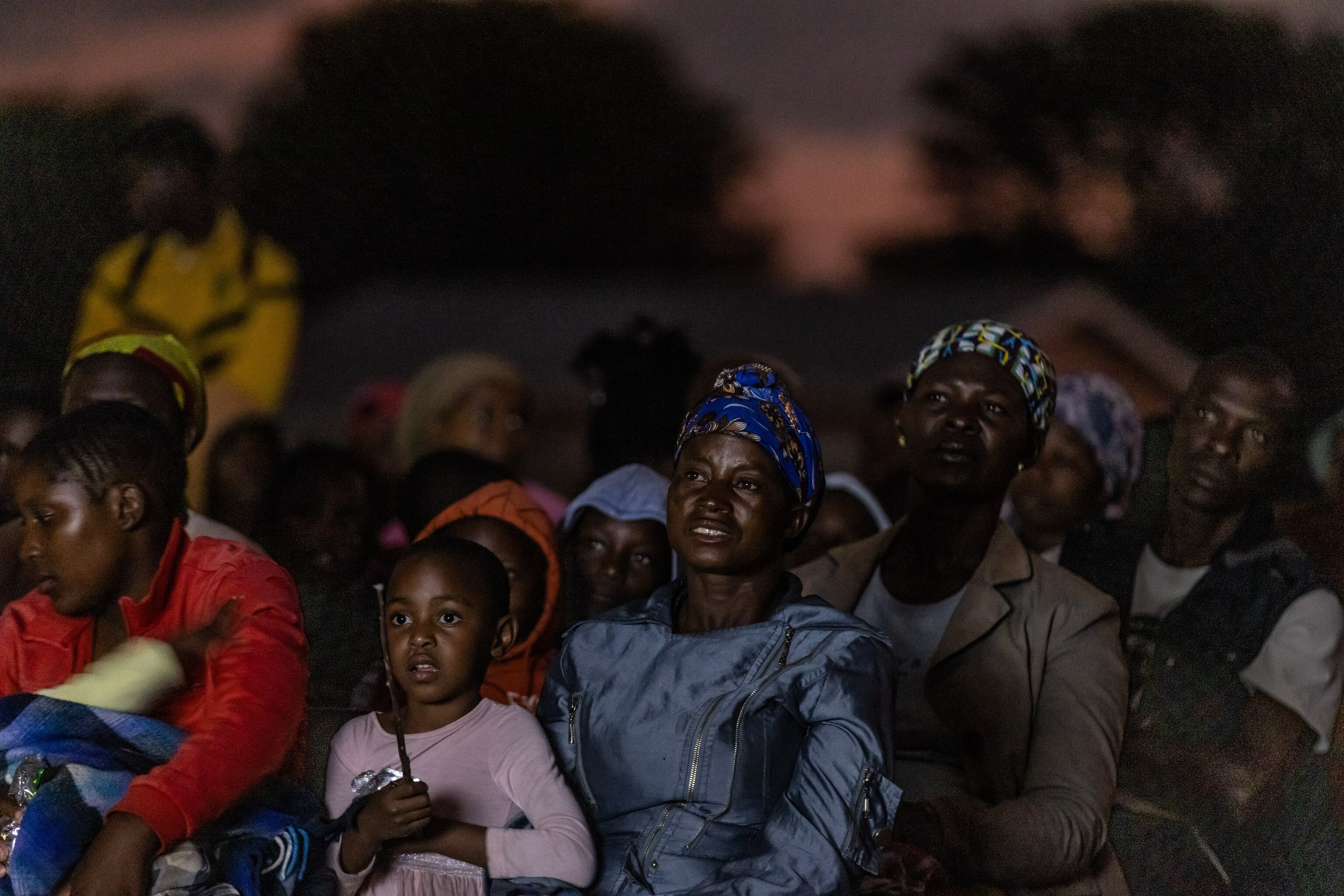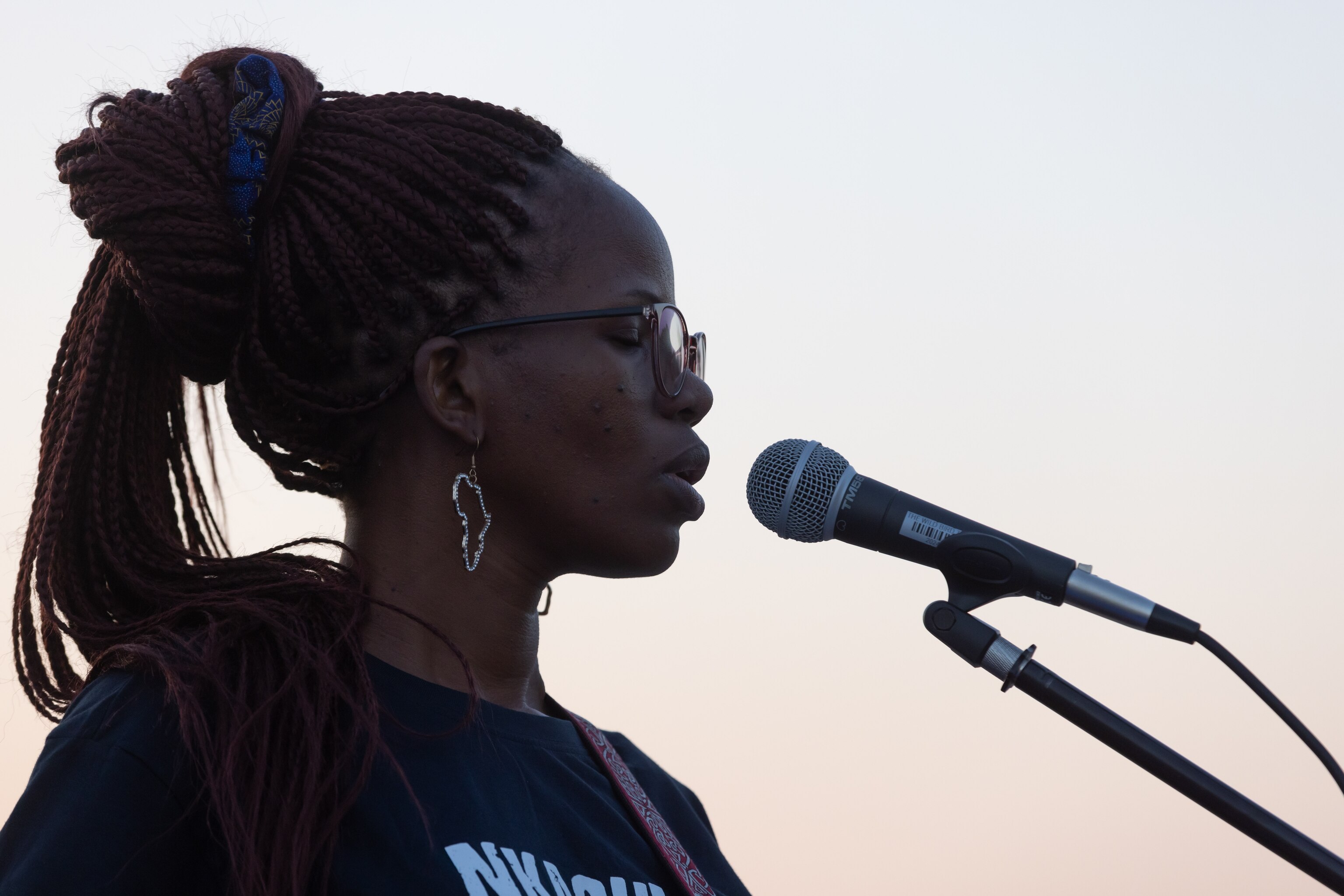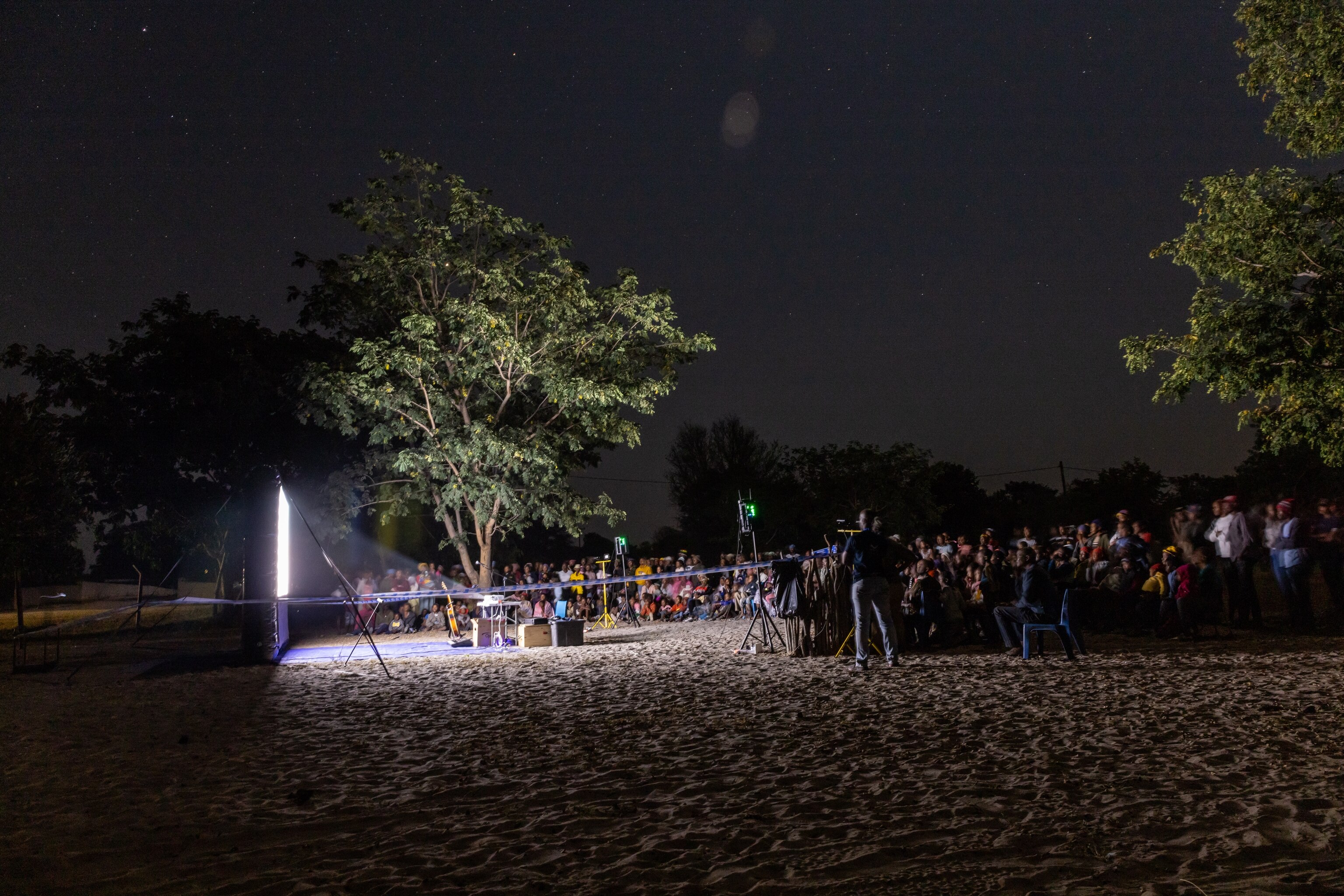Sharing Nkashi: Race for the Okavango with people of the Okavango Delta
Communities indigenous to the regions and rivers of the Delta—descendants of the BaYei and many other ancient cultures—are an important part of the Basin’s identity. As a powerful reminder, a documentary film showed these communities just how potent their heritage is.
A group of children gathers at the gate of the primary school in Gudigwa—a remote village on the eastern rim of the Okavango Delta Panhandle—while a crew of seven from the National Geographic Okavango Wilderness Project (NGOWP) are setting up for a rare public film screening.
A public announcement earlier in the day invited everyone to come and watch a new documentary film that evening at the school―for free. And the kids are eager. They have arrived an hour before the show, so they wait by the gate, staring in awe as the crew blows up a large, inflatable screen and does a sound check. The minute the gates open, excited children flood in, the dust they kick up forms a hazy golden backdrop behind them as they rush to take front row seats. As the dust settles, the elders, some wielding walking sticks, slowly make their way behind the children toward the school gate. It is a momentous occasion for this remote village: Tonight they will see a film about themselves—Nkashi: Race for the Okavango. They will hear their own language and watch their time-honored traditions celebrated on the big screen―a rare feat in this part of the world.

Nkashi: Race for the Okavango was created by the Impact Story Lab, an award-winning, creative unit within NGS, in close collaboration with Batswana filmmakers and local production company, Parable Motion. It highlights the triumphs and challenges of three mokoro (dugout canoe) polers, celebrates Botswana’s cultural heritage, promotes the benefits of maintaining traditional knowledge for communities, and illuminates the importance of the Okavango Delta’s people. The film also underscores the critical conservation and sustainable livelihoods work of the NGOWP, and prominently features Motswana National Geographic Explorer Koketso “Koki” Mookodi, NGOWP Botswana country director and leader of education initiatives through the Okavango Eternal project, a conservation partnership with De Beers.
Since the film’s creation, the goal has been to share it with the people of the Delta―right where they live. To achieve this, NGOWP, together with the Botswana Wild Bird Trust (BWBT), and funded by Okavango Eternal, premiered the film in 13 communities of the Okavango Delta, where it has been viewed by thousands of people. The road show, led by National Geographic Explorer Thalefang Charles, who is also a co-producer of the film, included recently appointed National Geographic Explorers Gobonamang “GB” Kgetho, one of the film’s main protagonists, and Tumeletso “Water” Setlabosha. There were also three musical artists: Koolkat Motyiko (Thato Kavinja) of “ko Seronga” fame, Ms. Gee (Gaekgone Lesego), and Prince B (Bogosi Tshekiso). These local musicians from the Okavango Delta scored the film, and even performed some tracks live during the road trip event. Their music helped to pull together crowds who sang along to hits like “ko Seronga” and “Ku Zimbe.” Technical consultant Tshepang Tumelo completed the dedicated, seven-member team that traveled by road, water, and air to access and include the remote villages of Shakawe, Gudigwa, Beetsha, Eretsha, Seronga, Gonutsoga, Ikoga, Etsha 13, Etsha 6, Jao, Gumare, Morutsha, and Xaxaba.

Films about the Okavango Delta rarely feature people, and seldom even shown or made available to audiences in Botswana. The Nkashi: Race for the Okavango road show set a major precedent for other local filmmakers.
The film, now airing on Botswana Television (BTV), first premiered in Maun, Botswana, and was followed by subsequent premiers in the capital city of Gaborone and then in the U.S. The film, through this road show, returned to the people of the river, giving those who use mekoro on a daily basis an opportunity to watch a story celebrating their culture and traditions, as well as to listen to their own, home-grown music. Many filmgoers shared comments about the film: Kelentshitse Tsima from Gudigwa was excited that the film showcased BaYei traditions, and urged the filmmakers to do the same for the Bukakhwe San (Bushmen) culture.
Another filmgoer, Xaakudi, from the village of Ikoga, said he loved the film’s portrayal of the NGOWP’s Delta Crossing expedition (an annual checkup of the Delta’s water quality and ecosystem health), and expressed interest in joining, so that he, too, could learn about the intricate waterways of the Okavango Delta from Seronga to Maun. “I really like what these polers are doing on your expedition. They are very privileged to continue to access these places and learn about the river, because these days we can’t simply go in there,” he said.
Xaakudi explained that it is currently difficult for locals to make trips across the Okavango Delta due to certain restricted areas. Many audience members thanked the filmmakers for focusing their work on the people of the Okavango Delta, pointing out that now tourists and potential visitors would know that the Okavango Delta is rich not only in incredible wildlife, but in culture, as well.

The Nkashi: Race for the Okavango road show coincided with the Nkashi Classic heats—the qualifying races before the main race event. And after watching the film, many audience members took the opportunity to go and test their poling strength at the competitions. Both the film and the race share the same goals: Raising awareness of―and boosting pride in―traditional skills and knowledge in the hope of maintaining them for long-term prosperity. The Nkashi Classic and documentary can also be considered, figuratively, part of a larger race to preserve the entire Okavango River Basin — the Okavango Eternal partnership’s overall goal is to support protection of the water tower that feeds the Delta and promote sustainable livelihoods for those who live across the region.
The 2023 Nkashi Classic race will take place in Maun, a town that facilitates most tourism movement in and out of the Delta, on August 26. Sponsored once again by Okavango Eternal, the event includes entertainment from top Batswana artists, and invites all to join, sit, eat, purchase local crafts and produce, and enjoy watching the crowning of the Delta’s fastest poler.
Find out more about the Nkashi Classic race here.